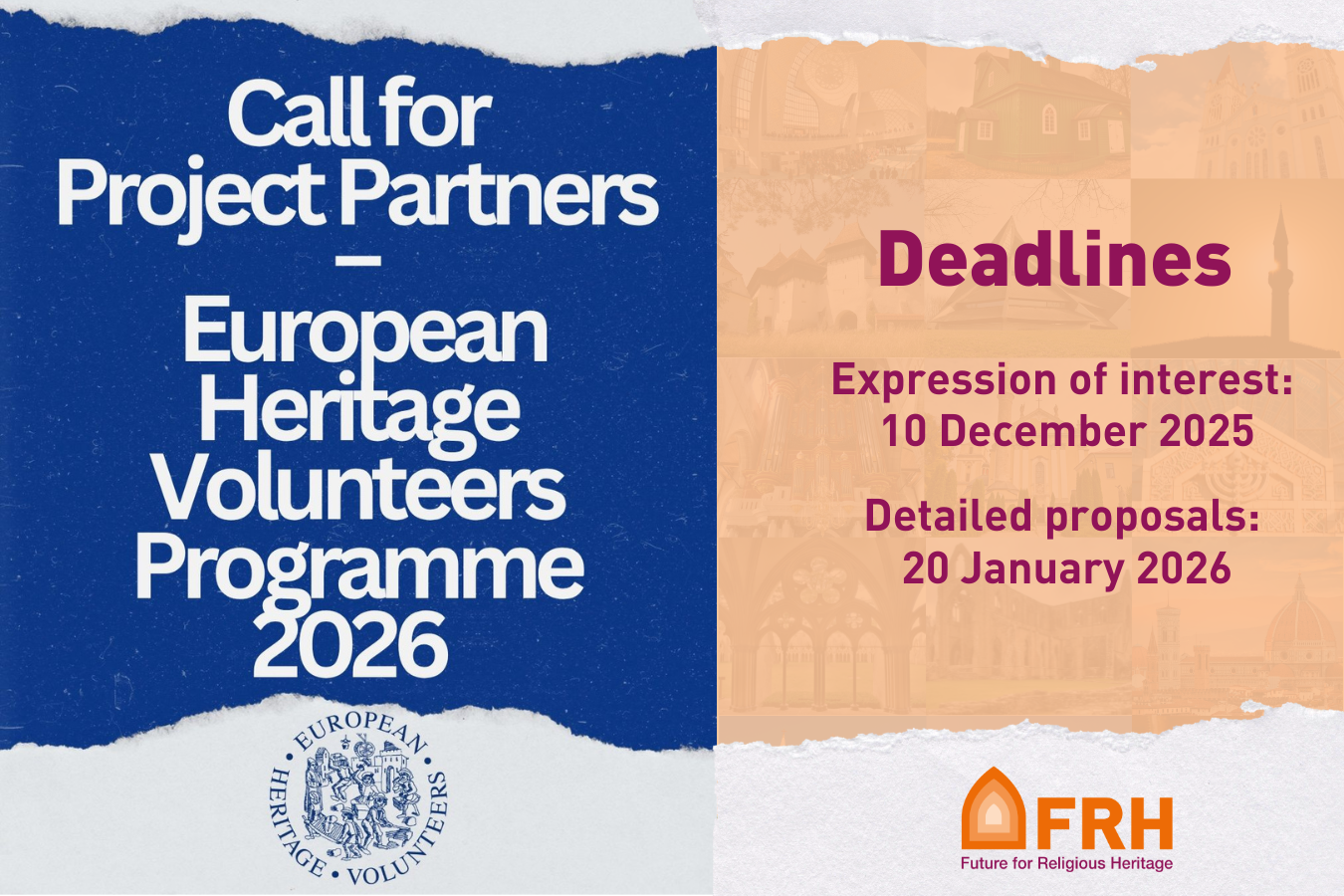
Deadline for expression of interest: 10 December 2025
Deadline for detailed proposals: 20 January 2026
Religious heritage sites are exceptional places to train the next generation of young professionals and to promote the valorisation of our shared European heritage. Building on our ongoing collaboration between FRH and European Heritage Volunteers, we warmly invite you to check the possibility of hosting a Training Course or Projects in the Summer-Autumn 2026.
What are European Heritage Volunteers training courses and projects?
These non-formal education programmes offer young people the opportunity to learn and develop skills in heritage documentation, interpretation, and conservation, guided by experienced craftspeople and heritage professionals from the hosting organisation. The duration is approximately 2 weeks, and apart from training and educational activities, it includes a visit for volunteers to know the site, and opportunities to meet the local community and connect with each other. Participants include both emerging professionals and motivated volunteers with no previous heritage-linked training or skills, all recruited and selected by the European Heritage Volunteers team.
Why participate?
Participating organisations benefit from close guidance from the European Heritage Volunteers team during the planning phase and throughout the implementation of the activities. European Heritage Volunteers take care of the recruiting and composing the groups of participants. They also provide networking opportunities, training for Technical Instructors and Group Coordinators, evaluation and feedback on the activities. A Project Partners Meeting, usually taking place in Spring, will allow you to meet the other partners and review the latest details for your training course or projects.
How can my organisation propose a training course/project?
If you are interested in proposing a programme and hosting a group of volunteers in the summer/autumn of 2026, the first step is to express your interest to European Heritage Volunteers by 10 December. You will then be invited to submit a formal proposal outlining your motivation, planned activities, and the technical staff from your organisation who will work with the volunteers. The European Heritage Volunteers team can support you throughout the conceptual development and refinement of your proposal.
We encourage you to use this opportunity to engage young people in meaningful heritage work while promoting the preservation and interpretation of your sites.
Some experiences from 2025…
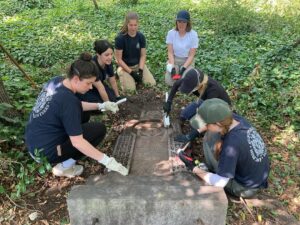 Documentation & Valorisation of Naumburg’s Cathedral Graveyard
Documentation & Valorisation of Naumburg’s Cathedral Graveyard
Eleven participants from eleven different countries worldwide dedicated their efforts to uncovering, cleaning, and systematically documenting all gravestones located in the north-eastern part of the historical Naumburg Cathedral Graveyard, in Germany. One of the project’s highlights was the discovery of the gravestone of Immanuel Christian Leberecht von Ampach (1772–1831), a collegiate church councillor, canon in Naumburg, and patron of the arts.
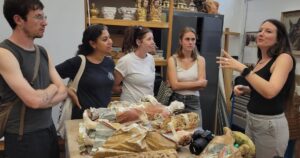 Conservation & Restoration of Stone Surfaces, Stična Monastery
Conservation & Restoration of Stone Surfaces, Stična Monastery
For two weeks, the Cistercian Abbey of Stična, Slovenia, served as the setting for intensive engagement with the conservation and restoration of historic stone. Under the guidance of specialist conservator-restorers, the international group of volunteers learned and applied both manual craftsmanship and modern technologies techniques in surface cleaning, consolidation, mortar repairs, and micro-abrasion treatments, working directly on the abbey’s historic main gate.
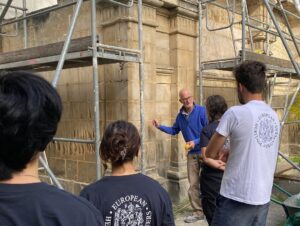 Conservation of Historical Surfaces, former synagogue of Halberstadt
Conservation of Historical Surfaces, former synagogue of Halberstadt
Under the guidance of an experienced conservators-restorers, a group of international participants engaged in practical tasks connected with the remnants of the Baroque synagogue, receiving detailed input on techniques such as gentle cleaning of painted layers, surface stabilisation, and the preparation of hot lime mortars. Beyond the worksite, the group immersed itself in the history of Halberstadt’s Jewish community, once a centre of Jewish life in Germany.
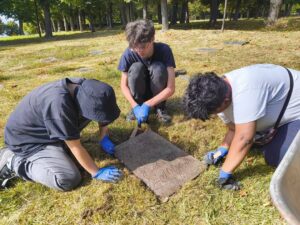 Documentation & Maintenance at a Cemetery of the Moravian Church
Documentation & Maintenance at a Cemetery of the Moravian Church
This training course took place at the historic God’s Acre, the cemetery of the Moravian Church Settlement of Herrnhut, Germany. Established in 1731, this cemetery became the prototype for Moravian burial grounds across the world. The work included the photographic documentation, transcription of inscriptions, state assessment, and maintenance of the historical site through the cleaning of grave plates, removal of invasive vegetation, and other minor conservation measures.
________________________________________________________________________________________
 |
| For more detailed information, please visit the European Heritage Volunteers website: https://www.heritagevolunteers.eu/EuropeanHeritageVolunteersProjects/CollaborationAsAProjectPartner? |





Follow us: